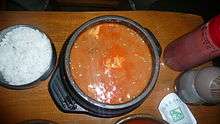Cheonggukjang
| Cheonggukjang | |
 | |
| Korean name | |
|---|---|
| Hangul | 청국장 |
| Hanja | 淸麴醬 |
| Revised Romanization | cheonggukjang |
| McCune–Reischauer | ch'ŏnggukchang |
Cheonggukjang (Korean pronunciation: [tɕʰʌŋɡuktɕ͈aŋ]) is a fermented soybean paste used in Korean cuisine. It contains whole as well as ground soybeans.
Production
It can be made in 2 to 3 days through fermentation of boiled soybeans, adding Bacillus subtilis, which is usually contained in the air or in the rice straw, at about 40°C without adding salt, compared with the much longer fermentation period required for doenjang, another, less pungent variety of Korean soybean paste. Like many forms of doenjang, cheonggukjang is paste-like in texture, but also includes some whole, uncrushed soybeans.
Cheonggukjang may also be made by fermenting boiled soybeans in a warm place, pounding a portion of them, and adding salt and red chili powder.
History
Cheonggukjang was introduced by what is now China to the Korean peninsula during the Joseon era. At the time, cheonggukjang was used as rations by Qing Dynasty soldiers.[1] Cheonggukjang is most often used to prepare a stew, which is also simply called cheonggukjang, but may be called cheonggukjang jjigae to avoid confusion.photo Cheonggukjang jjigae often includes additional ingredients, such as potatoes, onions, and tofu.
Nutrition and health
Cheonggukjang is generally considered to be a healthy food (particularly in the winter), as it is rich in vitamins and other nutrients, though its very strong odor is not universally enjoyed. Some people have commented that this soup gives off the aroma of wet socks. Doenjang may be used to replace it by people who dislike the smell.
In 1993, odorless cheonggukjang was invented by Dr. Hyun Kyu Joo, a former professor at Kunkook University, who later obtained a patent in 1998 for a method for removing cheonggukjang's characteristic smell.
Cheonggukjang is also believed to aid in digestion. For this purpose, cheonggukjang pills are produced in South Korea.
See also
References
External links
- Cheonggukjang recipe broken connection
- Cheonggukjang jjigae recipe broken connection
- Cheonggukjang site (Korean)
- Cheonggukjang recipe with pictures
